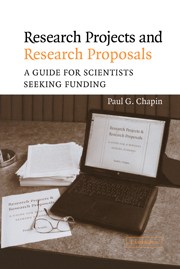Book contents
- Frontmatter
- Contents
- Foreword
- Acknowledgments
- Introduction
- 1 Selecting a Research Topic
- 2 Project Planning
- 3 Identifying Funding Sources
- 4 Special Funding Mechanisms
- 5 Writing a Proposal
- 6 Research Ethics and Responsibilities
- 7 The Natural History of a Proposal
- 8 “We Are Happy/Sorry to Inform You …”
- 9 Managing Your Grant
- Appendix A Glossary of Acronyms
- Appendix B Useful URLs
- Index
2 - Project Planning
Published online by Cambridge University Press: 14 July 2009
- Frontmatter
- Contents
- Foreword
- Acknowledgments
- Introduction
- 1 Selecting a Research Topic
- 2 Project Planning
- 3 Identifying Funding Sources
- 4 Special Funding Mechanisms
- 5 Writing a Proposal
- 6 Research Ethics and Responsibilities
- 7 The Natural History of a Proposal
- 8 “We Are Happy/Sorry to Inform You …”
- 9 Managing Your Grant
- Appendix A Glossary of Acronyms
- Appendix B Useful URLs
- Index
Summary
With a research topic in mind, it's time to start planning exactly how you are going to organize the project to study it. Notice that we did not say that it's time to start writing the research proposal. That is a strong and common temptation because the proposal is the most immediate tangible requirement facing the investigator, usually with a rapidly approaching deadline, but it is one to avoid. After careful project planning, the proposal will flow naturally and logically; but writing a proposal before working out the project plans first is an exercise in frustration and constant rewriting, as you repeatedly discover in writing a later part that you have to revise an earlier part to keep the whole thing coherent. In this chapter, we'll discuss a strategy for project planning that should give you the basis for writing a well-organized, logically coherent proposal in a limited amount of time.
Planning for Life or for a Proposal
In the first chapter, we mentioned the difference between selecting a research topic that is appropriate for a two- or three-year project and one that will occupy all or a large portion of your professional career. The same thought applies to project planning more generally. You may well have a set of long-term goals for what you want to do and to accomplish, scientifically, at various stages of your career. The kind of research planning we are discussing here, however, is both more limited and more extensive than that.
- Type
- Chapter
- Information
- Research Projects and Research ProposalsA Guide for Scientists Seeking Funding, pp. 13 - 23Publisher: Cambridge University PressPrint publication year: 2004



